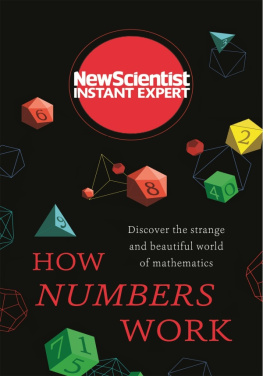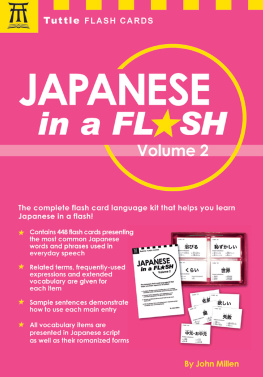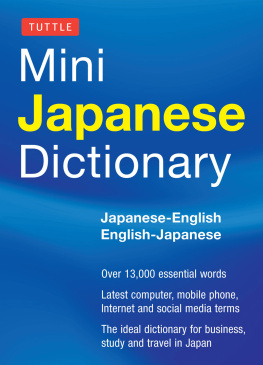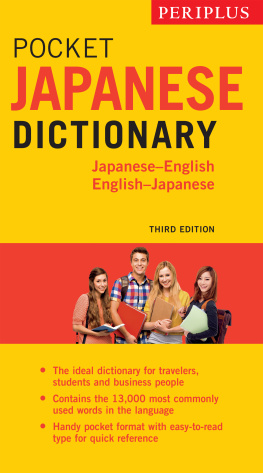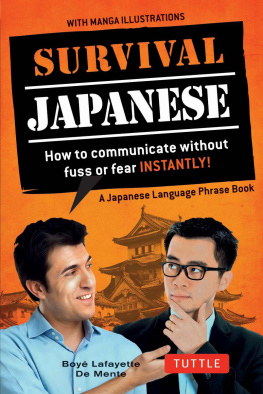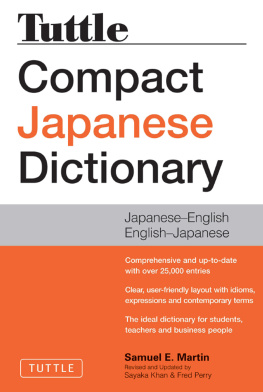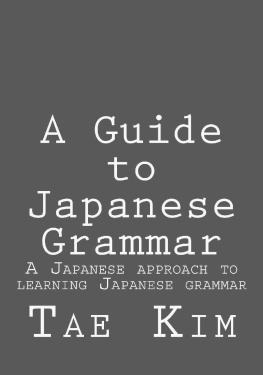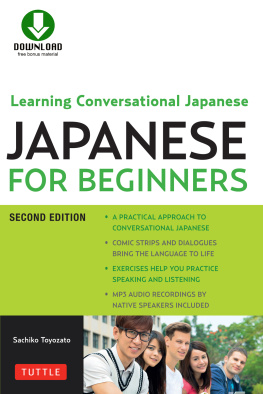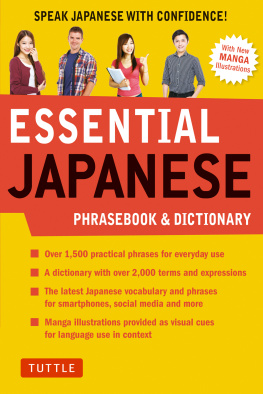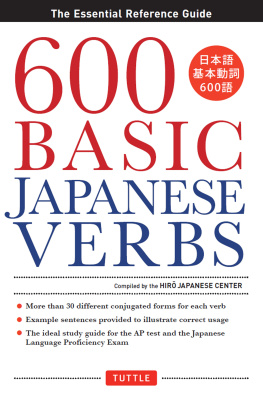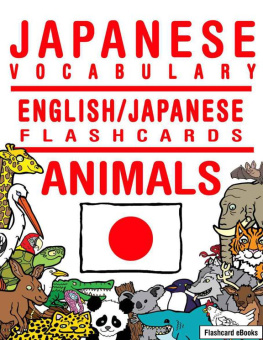80/20
JAPANESE
80/20 JAPANESE
Romaji Edition
Learn smarter,
start speaking today,
and get to fluency fast!
RICHARD WEBB
Copyright 2015, 2016 by Richard Webb.
All rights reserved.
No part of this publication may be reproduced, distributed, or transmitted in any form or by any means, including photocopying, recording, or other electronic or mechanical methods, without the prior written permission of the publisher, except in the case of brief quotations embodied in critical reviews and certain other non-commercial uses permitted by copyright law.
Although every precaution has been taken to verify the accuracy of the information contained herein, the author and publisher assume no responsibility for any errors or omissions. No liability is assumed for damages that may result from the use of information contained within.
ISBN 978-0-9953630-6-9
Published by Raw Lisard.
http://8020japanese.com
Cover design by Scott Lee, The Unspoken Pitch, www.theunspokenpitch.com.
Interior layout and eBook conversion by Jimmy Sevilleno.
Initial funding raised with assistance from Publishizer, www.publishizer.com.
This book was made possible thanks to the generous support of the following people:
Otohei Arai
Brian Frank
Charlie Huang
Minaho Imai
Larry Letofsky
Jonathan Luk
Michelle Mackenzie
Andrew Marshall
Eri Nakada
Annemaree OBrien
Andrew Ooi
Judi Powers
Johan Reunanen
Steve Rendell
Petter Sund
Guy Vincent
Jhonatan Sneyder Salguero Villa
Hsin-Yu Wang
Alison Webb
Masahiro Yamazaki
Thank you!
Contents
Introduction
Japanese is often considered one of the most difficult languages to learn. I thought this too, once upon a time, but now I know better. Yes, it is very different from English and pretty much every other language, but it is incredibly logical, flexible and has very few irregularities. With the right approach, I believe it is possible to learn to speak fluent Japanese in a very short period of time.
Thats why Ive written this book. I want to share with you the knowledge I have accumulated through years of formal study, over six years of living in Japan, and countless hours spent contemplating the finer points of Japanese and English linguistics.
When I first learned Japanese, I struggled with all kinds of concepts that, in retrospect, arent very difficult at all. The problem was that I didnt know what I was doing, or what I should be learning. I had textbooks and teachers that taught me all the basic grammar and sentence patterns, and I could even put some decent sentences together, but it wasnt until I studied in Japan that I finally got it.
The reason for that is simple - I spent a lot of time learning what to say, without properly understanding how Japanese really works. I had to figure a lot out on my own, which only came after being exposed to Japanese almost exclusively for months on end. If I had just had a better grasp of how languages work in general, and the specific things that make Japanese and English so different, I could have saved myself a lot of time and confusion.
This book is designed to give you the head start I didnt have. Wherever you are, if you want to learn to speak Japanese, this book will help you learn smarter, start speaking today, and get to fluency fast!
The 80/20 Approach
If you havent heard of the 80/20 rule, or Pareto Principle, it suggests that in any endeavor, 80% of the results come from 20% of the input. For a company, 80% of revenue usually comes from around 20% of its customers. In many sports, approximately 80% of the goals are scored by 20% of the players. The ratios wont always be 20% and 80%, but the point is that in anything you do, there are a few things that matter far more than everything else.
When it comes to languages, one of the most oft-cited examples of the 80/20 principle relates to vocabulary. In just about any language, the most common 1500 words or so usually account for 80% of the spoken or written language. For Japanese, the first 1000 words account for roughly 76% of the words that appear in novels. Although this is good to know, it is somewhat misleading, and misses the point of language learning.
Firstly, many of the most common words have very little meaning on their own, like the English words it, the and of. These words are essential, but they mostly just supplement other, less common words that have more meaning.
Secondly, the most common words overall will not necessarily by the most useful words for you. If your goal is to discuss politics in Japanese, youll need a very different set of vocabulary to somebody who wants to understand anime. Youre much better off learning the words you need over the ones youre told you should know.
More importantly though, a language is not merely a collection of vocabulary. A language is a skill, or more accurately, a group of skills that you use to communicate. The most important 20% of the Japanese language is therefore not a list of the most common words, but rather the knowledge and understanding that will allow you to practice and develop these skills most efficiently and effectively. Vocabulary is of course necessary, but it is only one piece of the puzzle.
To speak fluent Japanese, the most important skill you need is the ability to understand how sentences are formed, and how the words in a sentence relate to each other. You need to develop this skill above all others because it applies to everything, and because it is the single aspect that is most different to what you already know, making it the most difficult to master.
Despite this, the usual way people are taught Japanese essentially equates to being made to remember and practice lots of different sentence patterns that apply to specific situations. This works for a while, but it is severely limiting and leads to a lot of confusion. I experienced this myself, and wish I had started with a proper understanding of sentence formation, rather than having to figure it out for myself.
Thats why after introducing the sounds of Japanese, this book focuses first and foremost on giving you a proper understanding of Japanese sentence structure. It does this using simple examples and highlighting the important differences between Japanese and English. This teaches you to think differently, and lays the foundation that will allow you to say anything. Its the 20% of the language that will get you 80% of the way to speaking fluent Japanese.
One more application of the 80/20 rule in this book is to ignore written Japanese. Learning to read and write Japanese requires a lot of memorization and additional practice. I encourage you to learn these skills when you are ready, but at the beginning stages of learning a new language, an entirely new writing system is a distraction that slows you down and causes added frustration, making you more likely to quit. Instead, its better to focus on understanding the language first. That is the most important 20%.
Deconstructing Japanese
The skill of speaking Japanese can be broken down broadly into four pieces - pronunciation, listening, vocabulary and sentence building. The sounds of Japanese, which are relevant to both pronunciation and listening, are covered in Chapter 1, while the remainder of the book focuses on sentence building. In doing so, it also includes a variety of useful vocabulary.
Here is a brief introduction to each of the building blocks of spoken Japanese.
Pronunciation
This is really important, and people often dont spend enough time on this. Theres no point being able to speak Japanese correctly if nobody can understand what you say. You dont need to be perfect, but good pronunciation will make communication much smoother and more enjoyable, while also improving your listening skills. In the beginning especially, you should dedicate time every day just to practicing pronunciation. It takes time for the muscles in your mouth to develop the ability to make the new sounds accurately and efficiently, just like any other physical skill. The more you do it, the easier it will become.


